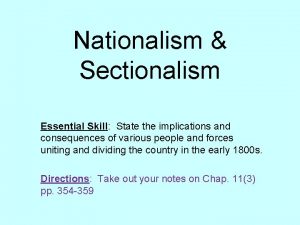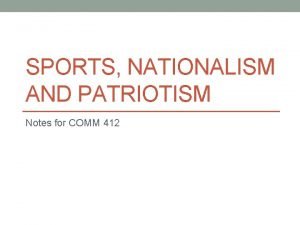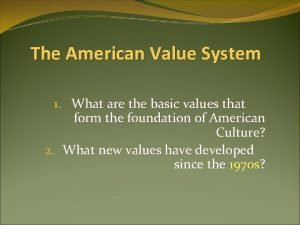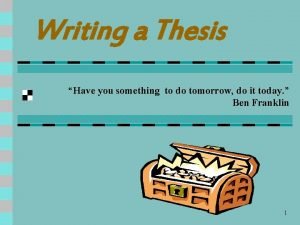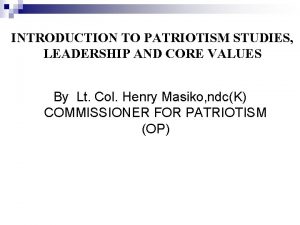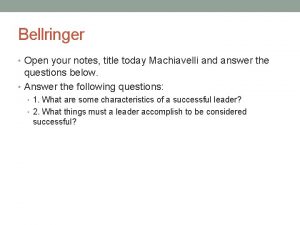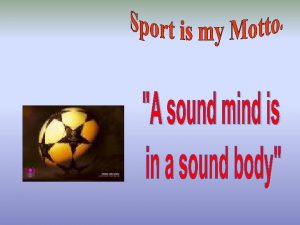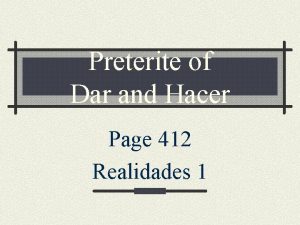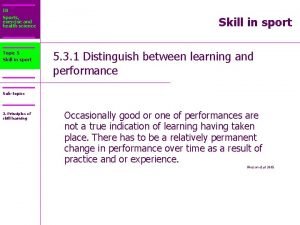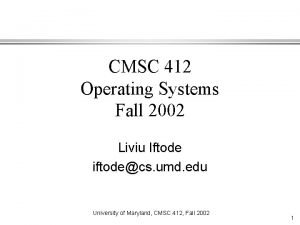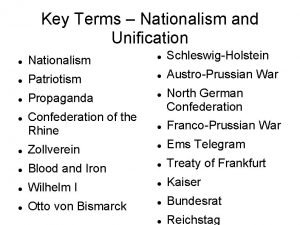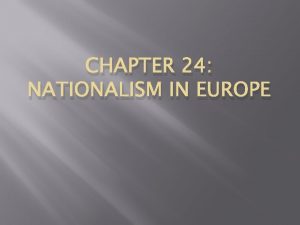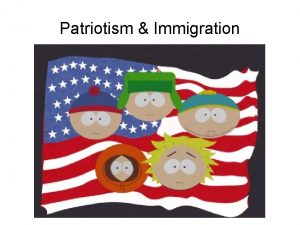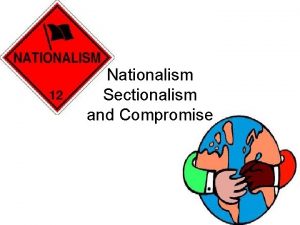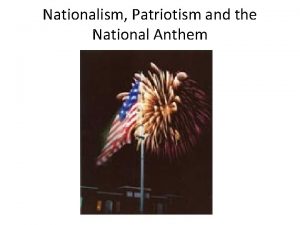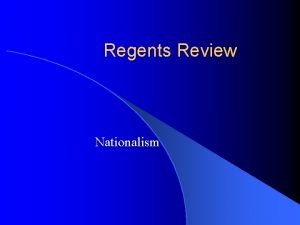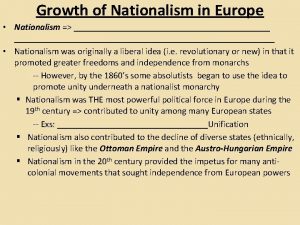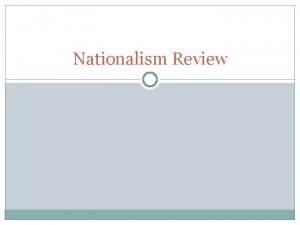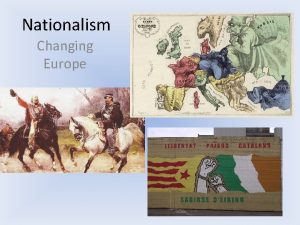SPORTS NATIONALISM AND PATRIOTISM Notes for COMM 412

















- Slides: 17

SPORTS, NATIONALISM AND PATRIOTISM Notes for COMM 412

Patriotism vs. Nationalism George Orwell, “Notes on Nationalism” (1945) • By "nationalism" I mean first of all the habit of assuming that human beings can be classified like insects and that whole blocks of millions or tens of millions of people can be confidently labelled "good" or "bad. " But secondly— and this is much more important—I mean the habit of identifying oneself with a single nation or other unit, placing it beyond good and evil and recognizing no other duty than that of advancing its interests. Nationalism is not to be confused with patriotism. Both words are normally used in so vague a way that any definition is liable to be challenged, but one must draw a distinction between them, since two different and even opposing ideas are involved. • By "patriotism" I mean devotion to a particular place and a particular way of life, which one believes to be the best in the world but has no wish to force on other people. Patriotism is of its nature defensive, both militarily and culturally. Nationalism, on the other hand, is inseparable from the desire for power.

Butterworth’s argument “My purpose is to examine the ways in which the “national pastime” functioned rhetorically after 9/11 and the US invasion of Iraq to constitute national unity—a unity that threatened, ironically, the very democracy it sought to preserve. These quasi-religious rituals of ballpark tributes helped to transform the communal healing process into an endorsement of the politics of war. ” What's at stake: • Democratic practice in public culture. • Democratic expression increasingly is at risk of being silenced in the name of consensus and unity. Issues: • Rhetorically constructed notion of patriotism • Sports arenas became sites of memorializing post 9/11 • Sport, but especially baseball and its quasi-religious rituals, are uniquely constitutive of American national identity. • It can ideologically discipline the notion of what is 'American’ and what is not. • Ritualistic performance of American faith and patriotism

Social Drama & Ritual • Discourse that produces an absolute sense of “us” or “them” threatens democratic pluralism. • Rituals not only may affirm values and norms but also may become instruments of political or ideological control. • “Civil religion. ” As Robert Bellah argues, civil religion is a uniquely American attempt to create public rituals and symbols that are “perfectly in accord with the will of God. ”

The Mythology of Sport • Sport, in fact, long has played a notable role in the reflection, construction, and maintenance of American cultural values. • Sport is not merely a reflection of culture, but that it functions ideologically to produce and reproduce culture, including political culture.

Church of Baseball (112 -114) More than any other sport, baseball embodies the mythology and ideology of American culture. • It has the deepest history of the nation’s major sports and has long been referred to as the “American game” or the “national pastime. ” • Furthermore, it is a celebration of “rugged individualism” and “American exceptionalism. ” • American exceptionalism takes its form in the traditions and character of the game of baseball, and in the ballpark itself, which provides a pastoral sanctuary from the world outside. • Given that baseball’s history complements the nation’s history, and that it is played on a daily basis, the game’s capacity for ritual and symbolic expression is, indeed, unique.

Church of Baseball (112 -114) • While baseball—its history and imagery—is rooted in cultural mythology, it has a distinctly religious quality as well. • The specific rituals of baseball enable the game to provide a religious experience for its daily congregation of fans (opening anthem, 7 th inning stretch, etc. ) • These acts provide a communal experience and produce a unity among the participants. The game and the season are performed in accordance with a strict liturgy that guides not only actions on the field, but the values that allow them to be interpreted.

Church of Baseball (112 -114) • “I do not mean to suggest here that baseball is religion. It is a game and a business. But, overly romanticized notions about the game’s spiritual inspirations notwithstanding, the clarity of religious imagery in baseball gives it a quasi-religious symbolic power. It is a power that can guide values and provide social order, and consequently can be a convenient tool of political ideology as well. ” • Jane Forbes Clark, Chairman of the National Baseball Hall of Fame and Museum, illustrates these values and their historical relationship: “Reaching across generations and bridging different heritages, baseball embodies fair play, ingenuity, and teamwork—core attributes of the American character. Baseball serves as a common legacy of a diverse people—it truly is our national game. ” • Because baseball’s history is deeply connected to the nation’s history, it possesses a capacity for a nostalgic idealization of American society. As many scholars have noted, moments of crisis often lead to a turn toward nostalgia. While this move need not necessarily be ideologically conservative in force, the link to values and attitudes of the past is more conveniently appropriated by a conservative politics. The entire ‘Church of Baseball” section is important to unpack

Nutshell argument Patriotism and nationalism function religiously, and that the use of national symbols at sporting events embodies the power of ritual. Especially when considering context, such as game on Sept 11, 2002: • The ritualized nature of these actions, as well as the solemnity of the occasion, allowed the ceremony to retain its quasi-religious character, while the symbols of military prowess and the prominence of nationalist imagery transformed the ceremony into a political statement. It served as a political rally just one day before President Bush spoke to the United Nations about a possible invasion of Iraq. Just as the “war on terrorism” had shifted from Afghanistan to Iraq, ballpark tributes shifted from a ritual of healing to a ritual of rallying political support for a policy of war. In so doing, they helped to normalize Bush’s rhetorical efforts and to reduce the likelihood of political opposition.

Recognition of what ‘support’ means Two weeks after invasion of Iraq in 2003 MLB Commissioner Bud Selig again recognized baseball’s role under the political circumstances: “I’m very proud of the role baseball played after 9/11 and through the World Series…It was magnificent. And I believe strongly that in its own way, baseball will be good for our country now. ”

Dissent (or lack thereof) • “Although these rituals by themselves could not have guaranteed public support for a war in Iraq, they contributed rhetorically to the Bush administration’s efforts to suppress democratic discourse and limit dissent. While dissent was not absent from public discourse about the war, it was rarely found within the cathedrals and culture of baseball. ” • Baseball Hall of Fame president suggested to actors Susan Sarandon and Tim Robbins that their dissenting views could "ultimately put our troops in even more danger" when cancelling the Bull Durham tribute that had been planned for 2003.

Dissent cont. Rare public critique of the excessive display of patriotism during games at Yankee Stadium: • “Soldiers of war march all over the field before the game, unfolding a giant flag. Rudy Giuliani…is introduced as “America’s Mayor. ” An eagle flies across the Stadium. The eagle is supposed to represent freedom, but he is trained to fly nowhere, to his handler on the mound. In the seventh inning, we are told to stand offer a moment of silence in remembrance of our armed forces. Again, if you dare to feel uncomfortable, if you think this is not the place or time for such introspection, you’re un-American. . Ronan Tynan sings a stirring rendition of “God Bless America” that lasts forever, that belongs anywhere but between innings of a baseball game. None of this creeping nationalism has anything to do with baseball. ” - Filip Bondy of the New York Daily News

Butterworth’s conclusion • “If baseball can be understood as a representative institution of American democratic culture, then the ways in which it performs (or fails to perform) democratically merit scrutiny and criticism. ” • “Although ballpark rituals provided an early opportunity to mourn collectively, they evolved quickly into expressions of American nationalism and hegemony. By invoking rituals rooted in religious symbolism, these ceremonies conveyed an aura of national unity and a perception of a foreign threat that de-legitimized dissenting opinions. In the end, they reinforced President Bush’s declaration that only two choices remained after September 11: You are either with us, or you are with the terrorists. ”

Scott – NFL Selling Football + War Super Bowl XXXVI aired on Fox on Feb 3, 2002 • The broadcast started with NFL players reciting a pastiche of patriotic quotes, including Teddy Roosevelt’s “we do not admire the man of timid peace; we admire the man who embodies victorious effort. ” Throughout the game, NFL on Fox showed military commandos, battle maps, and crosshairs in its cutaway graphics. During a Fox News broadcast on the second day of the Iraq War, March 21, 2003: • Vietnam veteran David Christian compared Iraq’s rag-tag resistance to a scrappy high school football team, and called America’s army “professionals. ” CNN commentator Colonel David Hackworth proudly likened the United States’ armed forces to the Dallas Cowboys. 2007 broadcast of Super Bowl XLI — which began with a report about a flag football game played by soldiers in Iraq — was the second most-watched TV program ever. Media scholar Deborah Jaramillo describes how football in this period became a lens for interpreting Operation Iraqi Freedom, an event that football cheered for.

Scott Continued “With the peaceful pretext of society stripped away by terrorist provocation, post-9/11 America fully embraced the NFL, the sport with the grizzly gridiron gladiators. ” “Sports journalist Frank Deford reflected on this state of affairs in 2010, noting that “football provides us with nostalgia for the way war used to be: Clear battle maps, focused campaigns, simple battle lines. ” “In this polarized climate, the NFL attempts to relate the country’s differences through the conduit of pop culture. On their Sunday Night Football broadcasts, NBC uses white country musicians to market a league that is 68% black to an audience that is 77% white. By projecting the stylistic extremes of race, the network encourages all of America to meet somewhere in the middle. ”

Scott Continued Department of Defense • A 2015 report by the U. S. Senate, titled “Tackling Paid Patriotism, ” reveals that from 2011 thru 2014, the Do. D paid $5. 4 million to 18 NFL teams in exchange for ceremonies that celebrated the armed forces. Air Force flyovers, decorated generals conducting the pregame coin toss, and soldiers running on field with the flag? All are bought-andpaid-for displays of patriotism. • The largest of these Do. D-NFL contracts generally tended to go to franchises in the south or sunbelt: The Atlanta Falcons ($879, 000); the Baltimore Ravens ($534, 500); the New Orleans Saints ($472, 875); and the San Diego Chargers ($453, 500). Exceptions to this rule include the team in the non-Sunbelt State with the largest population of military enlistees (the Seattle Seahawks, $453, 500), and — of course — the New England Patriots ($700, 000).

Bryant on Sports & Patriotism HIS ARGUMENT: "The sports-military-patriotism alliance, is very much alive and embraced as normal. ” • “The entertainment event with the most political and militaristic overtones, and the phenomenon is not organic, but mandated and encouraged by the leagues. ” • "The indirect message goes unmentioned: codifying these elements into the sports experience is forcing the fan to tacitly endorse them. ” OTHER ISSUES TIED TO SUCH SENTIMENTS ($): "Sports and patriotism have permanently merged, not only as part of the event but also financially. In a time of fear, nationalism and patriotism sells. . . anyone who disagrees with this trend is immediately branded as unpatriotic. Fans are the target demographic and patriotism is part of the sales pitch. ” CULTURAL CONTEXT: "It is not a coincidence that in a frightening time, the Hero Era dominates the popular culture. Hollywood fills theaters with sequels, vampires and heroes, but especially heroes. ” BIG PICTURE: "Perhaps instead of being told who and what to cheer for by billion-dollar sports leagues, it should be remembered that the greatest freedom -- fought and died for by so many of the young men and women trotted out to throw out the first pitch -- is dissent. "
 Patriotism vs nationalism venn diagram
Patriotism vs nationalism venn diagram Patriotism notes
Patriotism notes American value system
American value system Generalization persuasive technique
Generalization persuasive technique Thesis statement about abortion
Thesis statement about abortion Patriotism as a core value
Patriotism as a core value Bellringer security
Bellringer security Which of these sports are indoor
Which of these sports are indoor The preterite of hacer and dar (p. 412)
The preterite of hacer and dar (p. 412) Ib sehs topic 5
Ib sehs topic 5 Sports exercise and health science ib
Sports exercise and health science ib Tum-412
Tum-412 Resolucion 412 de 2000
Resolucion 412 de 2000 Kj 412
Kj 412 Liviu iftode
Liviu iftode Mykrispykreme.com
Mykrispykreme.com Ertugrul 412
Ertugrul 412 Ertugrul 412
Ertugrul 412
